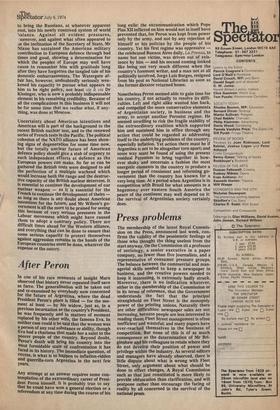After Peron
In one of his rare moments of insight Marx observed that history never repeated itself save as farce. The generalisation will be taken out and re-examined by everybody now concerned for the future of Argentina, where the dead President Peron's place is filled — for the moment at least — by his widow, just as, in a previous incarnation as the country's President, he was frequently and in matters of moment replaced by his other wife, the famous Eva. In neither case could it be said that the woman was a person of any real substance or ability, though Eva had a charisma that made her a saint to the Poorer people of the country. Beyond doubt, Peron's death will bring his country into the most formidable state of confrontation it has faced in its history. The immediate question, of corrse, is what is to happen to inflation-ridden and guerrilla-torn Argentina in the next few years.
Any attempt at an answer requires some contemplation of the extraordinary career of President Peron himself. It is probably true to say that he could have won a general election or a referendum at any time during the course of his long exile: the excommunication which Pope Pius XII inflicted on him would not in itself have prevented that, for Peron was kept from power only by the army, and not by any rejection of himself or his policies by the people of his country. Yet his first regime was oppressive — the celebrated Buenos Aires daily, La Prensa, to name but one victim, was driven out of existence by him — and his second coming looked like being not very much different when the country's foremost writer, and a man not at all politically involved, Jorge Luis Borges, resigned from his post as National Librarian as soon as the former dictator returned home.
Nonetheless Peron seemed able to gain time for his country, if not actually to resolve its difficulties. Left and right alike wanted him back, and compelled the more conservative elements of Argentinian society, in business and the army, to accept another Peronist regime. He seemed unwilling to risk the fragile stability of the extraordinary coalition which supported him and sustained him in office through any action that could be regarded as addressing itself to the underlying problems of the country, especially inflation. Yet action there must be if Argentina is not to be altogether torn apart; and some way must be found of using the present residual Peronism to bring together in however shaky and uncertain a fashion the most energetic elements in the country to produce a longer period of consistent and reforming government than the country has known for a very long time. At a period when Argentina is in competition with Brazil for what amounts to a hegemony over eastern South America the peace of the continent may well depend on it: the survival of Argentinian society certainly does.
Press problems
The membership of the latest Royal Commission on the Press, announced last week, confirms the validity of the pessimistic feelings of those who thought the thing useless from the start anyway. On the Commission sit a professor of sociology, a senior executive in a paper company, no fewer than five journalists, and a representative of consumer pressure groups. The balance between the commercial and managerial skills needed to keep a newspaper in business, and the creative powers needed to keep it interesting, is extremely badly struck. Moreover, there is no indication whatever, either in the membership of the Commission or in its terms of reference, that the Government understands the fact that the principal stranglehold on Fleet Street is the monopoly power of the printing unions. Naturally there are other difficulties: newspaper sales are not increasing, because people are less interested in reading them; Fleet Street management is often inefficient and wasteful; and many papers have over-reached themselves in the business of competition. But none of this is of as much consequence as the determination of Mr Briginshaw and his colleagues to retain where they do not develop their position of power and privilege within the industry. As several editors and managers have already observed, there is little dispute about what is wrong with Fleet Street, only argument about what should be done to effect changes. A Royal Commission such as that just constituted is more likely to provide obfuscation than clarification, and will postpone rather than encourage the facing of reality by all concerned in the survival of the national press.


































 Previous page
Previous page